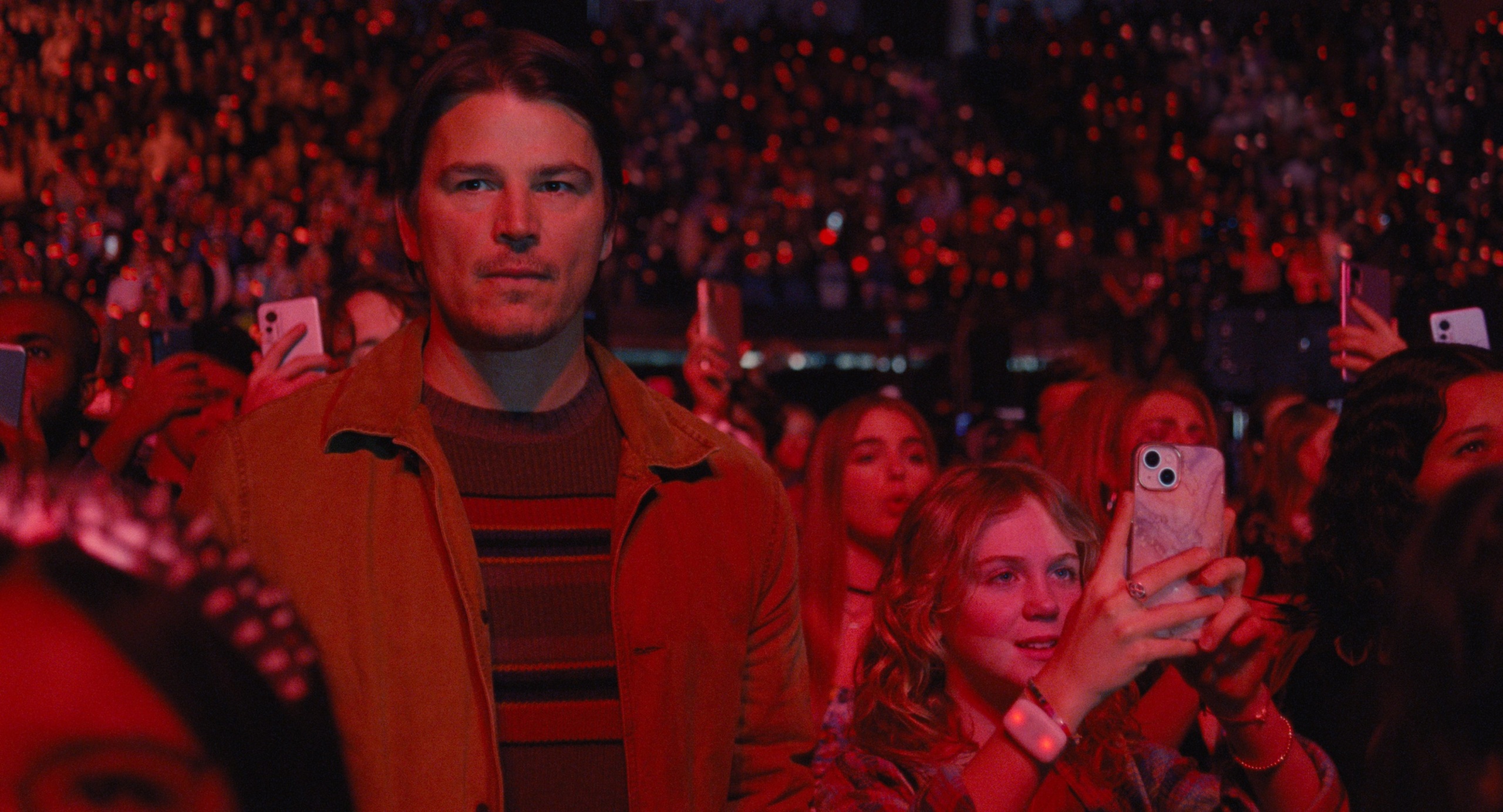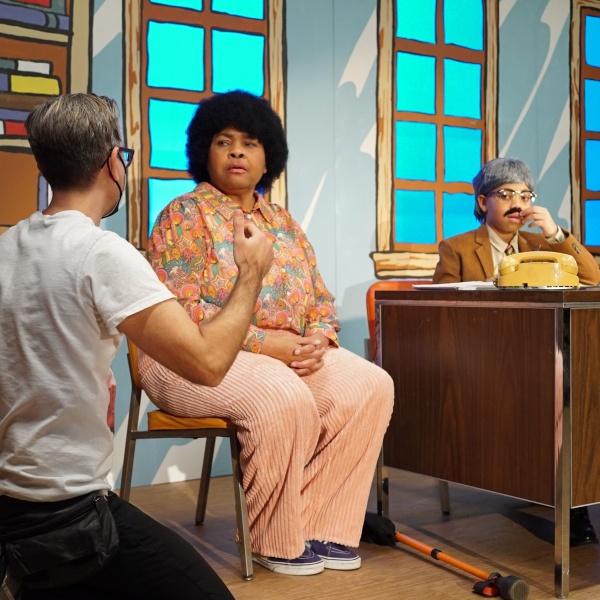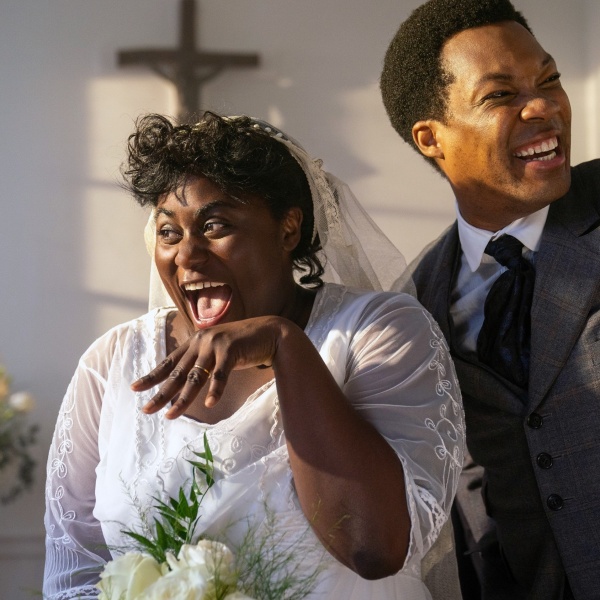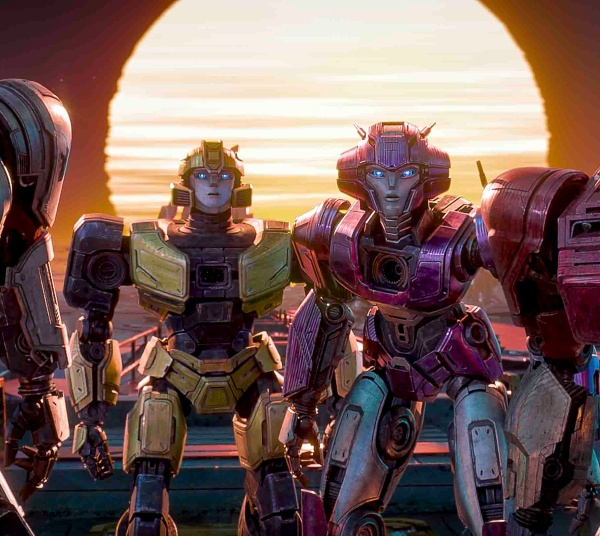Cooper has one of those faces you just can’t help but believe. He’s got still-intact, onetime-heartthrob looks, bangs that fall right in the place that devastates you, and a smile that’s expressive even when his gimlet eyes aren’t. Am I talking about the protagonist of M. Night Shyamalan’s new thriller “Trap” here, or the man, Josh Hartnett, who plays him? As this silly, contrived, yet stylishly executed cat and mouse game reveals, Cooper is not just the father of a pop-star-obsessed tween. He’s also a serial killer with OCD — that his SUV is black because black always looks cleaner by default is a telling sign, according to an FBI profiler eventually hunting him from the sidelines of a Taylor Swift-sized stadium concert. And like one of serial killer cinema’s most darling poster boys, namely one Norman Bates with the original face “you just can’t help but believe,” he’s got serious Freudian mommy issues now dovetailing with what could be his final kill. This silly upper-mid Shyamalan effort is too plausibility-stretching to be actually scary, but Hartnett’s well-calibrated performance as a psycho dad, the type who sends PTA moms all aflutter, is too dangerously charismatic to ignore.
That pop star is called Lady Raven (Saleka Shyamalan, the director’s daughter, who also writes and performs all the film’s slickly produced and vaguely catchy original pop songs), and her fans, like Swifties or Little Monsters or the Beyhive, have a nickname of their own: The Hive. And similarly, they throw themselves with cultish adulation at the singer’s feet like worshippers at a shrine, projecting their story onto her personally tinged songwriting. Lady Raven, too, is meant to evoke any malleable youngster turned corporate peddler of popular earworms, with glossy anthems and ballads more akin to a post-Fifth Harmony but pre-cynically rebranded Camila Cabello than an Ariana Grande.
But anyway, she’s one half of the center of Riley’s (Ariel Donoghue) world. The other is Cooper, a dashing fireman and family man who’s finally realizing Riley’s dream of attending a Lady Raven concert, perhaps to drown out the shrieks and car singalongs for a bit, or perhaps to put out of mind for a few hours the fact that he has a desperate young man chained in a basement in New Jersey. Shyamalan, writing and directing his first film not based on prior material (whether his own as with “Glass” or others’ in the misbegotten cases of “Old” and “Knock at the Cabin”) since 2015’s “The Visit” and all the better for it, reveals Cooper’s macabre nature early. Stealing away in a toilet stall before showtime, Cooper opens up his phone to check in on his latest victim (about to be his 13th), now facing into the camera and begging for his life.

“It must be hard seeing what everyone’s doing all the time,” Cooper says with the Sphinxlike intonation of a father-shaped-being trying to relate to his daughter, who’s been shafted by other classmates having the time of their lives at the concert on social media. The truth is that Cooper might be her only friend, and serial killer or not, he’s certainly savvy at maintaining the exterior of being a good dad. In the between-songs ado at concessions, girls clawing at the last remaining Lady Raven merchandise T-shirts in their size, Cooper has a jarringly framed run-in with the mom (Marnie McPhail) of one of Riley’s classmates. The actors address the camera head-on, almost looking directly into our eyes, and deliberately evoking memories of Hannibal Lecter and Clarice Starling staring dead at each other in “The Silence of the Lambs.” But here, the fictional Tanaka Arena (a Toronto location standing in for Philadelphia) is a venue quite different, vaster and more hospitable to entropy, than a behind-glass cell at the Baltimore State Hospital for the Criminally Insane.
As Cooper discovers, the entire Tristate police force has descended upon Lady Raven’s show to catch him, The Butcher, as he’s colloquially known, even though they only have a half-formed understanding of what he looks like. They’re under the guidance of FBI profiler Dr. Josephine Grant (an excellently frosty Hayley Mills — yes, that Hayley Mills), seen surreptitiously lurking around Tanaka and intoning dispatches via radio to police about the killer’s psychological makeup, and she’s typically one step ahead of Cooper even as he manages to steal a staff pass and hatches other think-quick schemes to evade discovery. That law enforcement is not able to more swiftly find Cooper amid a crowd of 3,000 men out of 20,000 people, believe it or not, starts to become a credibility-stretching albatross in the screenplay, but Shyamalan after all has to keep the risible aspects of the plot in ever forward motion. Fever dream asides where Cooper hallucinates his once-too-doting and now-dead mother unfortunately underscore how psychologically pat Shyamalan’s script is, skirting symbolism without taking a psychoanalytic plunge below flesh level. (And “Trap,” by the way, is perhaps the most PG-13 movie ever made about a serial killer.)
Shyamalan’s cinematographers tend to elevate even the schlockiest of his material, and that’s part of what makes his work so visually commanding, from Tak Fujimoto’s funereal palette on “The Sixth Sense” to more recently “It Follows” and “Us” DP Mike Gioulakis’ apocalyptic vacation vibes on the B-movie throwback “Old.” For “Trap,” Shyamalan hired Sayombhu Mukdeeprom, the trusted cinematographer of Apichatpong Weerasethakul and Luca Guadagnino. And it was, in fact, Shyamalan’s love for “Call Me By Your Name” that compelled him to seek out the Thai cinematographer who, shooting “Trap” on 35mm Kodak film, brings both a cool-handed gloss and a grit as scuzzy and quietly ominous as something like 1988’s Dutch thriller “The Vanishing” — also about an obsessive-compulsive serial murderer. Shyamalan would do right to hire Mukdeeprom again.
Though “Trap” is hardly predictable, Shyamalan is unburdened by the drive toward a twist ending that’s plagued many of his films since such a thing became a Shyamalan fait accompli after “The Sixth Sense.” Though a close-up on the spokes of a fixed gear bike in the film’s coda should inspire a gasp or two in the audience once its significance sets in. Like the red doorknob in “The Sixth Sense” or the glasses of water Abigail Breslin left around her family’s farmhouse in “Signs,” Shyamalan has trained audiences to keep a close watch on objects: Here, a deep fryer, a switchblade, or a slice of pie no one in a horror movie should think about eating.

“Trap” is not without Shyamalan’s sly humor and daffy in-jokes. Like Kid Cudi as a type-A star who crashes Lady Raven’s concert and, in a bleach-blonde wig that’s giving more Jynx the Pokemon than pop diva vibes, coquettishly winks at hot dad Cooper backstage. Or the requisite Shyamalan cameo itself, the director appearing as Lady Raven’s bouncy uncle who takes Cooper and Riley backstage to meet her. The leaps the screenplay takes over crater-sized plotholes are inherently funny in themselves, the movie self-aware on the edge of its own ridiculousness, like when Cooper entreats his daughter to join him in checking out a trap room opened up below the orchestra floor as a possible escape route. No, that would be crazy.
Hartnett is in on the joke, going against the type he was pigeonholed into by Hollywood as a teen matinee idol who won our hearts and other body parts in “The Virgin Suicides” as too-cool boy-next-door Trip Fontaine, or as a self-induced sexual ascetic in “40 Days and 40 Nights.” During a late-breaking domestic confrontation (Cooper’s wife is played by a calmly frantic Alison Pill), Cooper removes his shirt, presumably to keep the blood about to be shed from staining it, and while Hartnett’s body is undeniably great, he doesn’t have CoolSculpted abs of steel, which is refreshing and just a bit adorable. That Hartnett is so inherently lovable makes it hard to believe he’s some calculating killer, but it’s that very persona Shyamalan wants to play with. It’s a gamble to situate a cat and mouse from the perspective of the cat (until, of course, he’s not), but in some sick inside way that’s toying with how we fetishize serial killers as entertainment, we’re cheering him on anyway. And right up to his final sleight of hand, Hartnett maniacally laughing, his sneer bringing us back to that final shot of Norman Bates in Hitchcock’s 1960 movie. A hot psycho indeed.
Grade: B
“Trap” is now in theaters from Warner Bros. Pictures.






